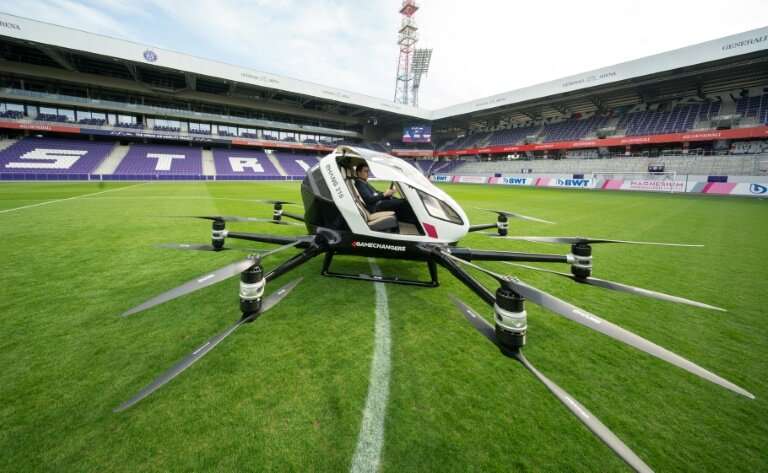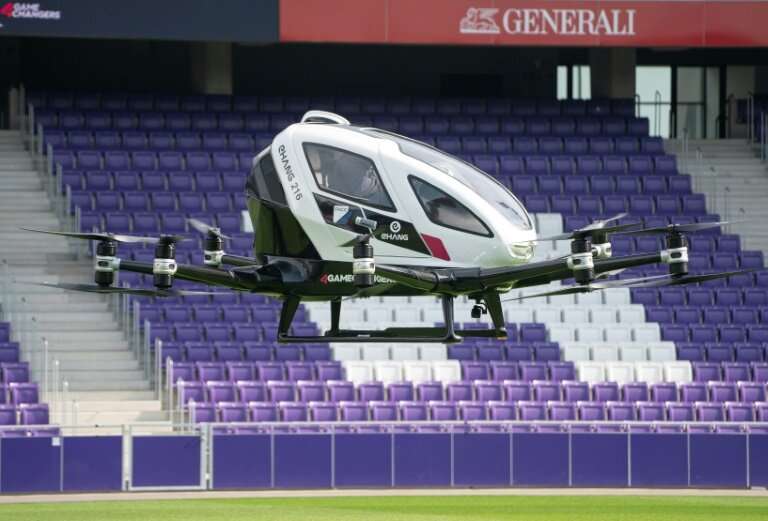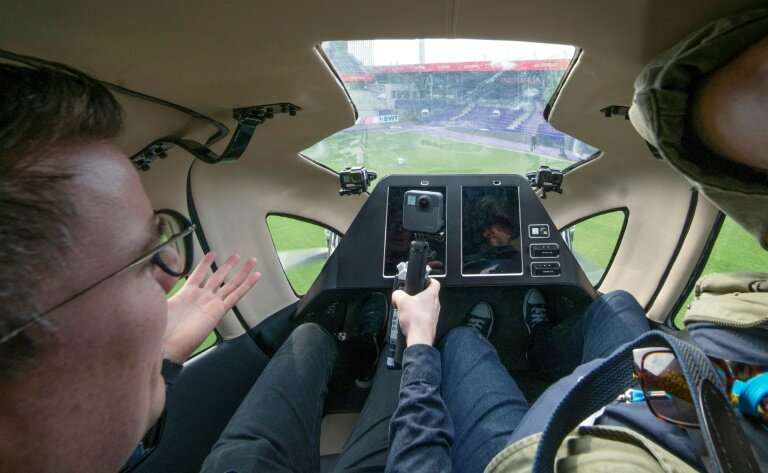A short first hop for 'drone taxi' in Vienna

It was more of a small step than a giant leap, but the first public outing of a pilotless "drone taxi" in Vienna on Thursday nevertheless offered a glimpse into the possible future of urban travel.
Several big companies such as Boeing and Airbus are working on their own versions of the technology but it was the Chinese firm EHang that unveiled its aircraft to assembled journalists in the Austrian capital's Generali Arena football stadium.
But anyone expecting to see it gliding over the Danube was to be disappointed—it is as yet not certified for Austrian airspace and stayed firmly within the confines of the stadium after a vertical hop of around 10 metres (about 30 feet).
Being inside the two-seater EHang 216 was "funny, soft and surprisingly noisy," said AFP photographer Joe Klamar, one of the first journalists to climb aboard, adding that the cabin was "very cramped".
"The rotors are scary but we got used to it," he added.
The EHang 216 is equipped with eight sets of rotors which emit a noise level of 90 decibels, below a normal helicopter but still easily loud enough to be uncomfortable.
The firm says it hopes to get the noise level down to 75 decibels.
Resistant 'mentalities'
EHang says it eventually hopes to use to the drone to carry passengers at low altitude over distances of up to 35 kilometres (22 miles) but for now still needs to be cleared for use by aviation authorities.

"Our biggest challenge is not technology, it's not regulation, it's people's mentality," says EHang's chief marketing officer Derrick Xiong, referring to possible reticence on the part of passengers towards the new vehicle.
The company says it has received "thousands" of pre-orders and that is working with Austrian aeronautics company FACC to start mass production as of next year.
Xiong says early interest has come from "oil and gas companies who want to transport engineers from one platform to the other" as well as tourism companies and firms transporting organs for transplant.
He said the EHang is expected to cost around 200,000 euros but would not be available for private buyers.
"Technically speaking its not a dream, its a reality," FACC CEO Robert Machtlinger told reporters, adding that the project had already carried out 7,000 flying hours, of which 2,000 have been manned.
The Austrian company, which has a turnover of around 800 million euros ($900 million), supplies aerospace giants including Airbus, Boeing, Bombardier and Embraer.
It said it hopes to produce around 300 of the drone taxis by mid-2021.

Hybrid technology
EHang has been carrying out most of its testing in China, as well a test flight in February 2017 in Dubai which was closed to the public.
Manufacturers working on other drone taxi prototypes—notably the German Volocopter—have been in touch with aviation authorities, including the EU's European Aviation Safety Agency, to try to get authorisation for their models.
"Some draft regulations are already existing" says Machtlinger, but adds that getting drone taxis legal status is complicated by their hybrid nature: "It's not a helicopter, it's not an aeroplane."
Austrian Transport Minister Norbert Hofer, who was present at Thursday's demonstration, said he hoped Austria could be among the first countries to have drone taxis flying regularly in its cities.
Dubai has also expressed interest in being an early adopter of the technology.
EHang says its drone taxi can fly unaided for 30 minutes and reach speeds of up to 130 kilometres (80 miles) an hour and carry 260 kilos (570 pounds).
With its 17 kilowatt battery, its energy consumption per journey is "comparable to an electric car in an urban environment," says Machtlinger.
© 2019 AFP





















